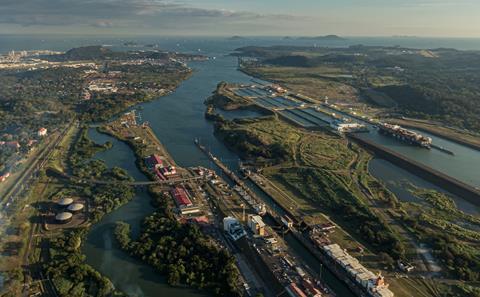Geopolitical tensions and climate change are raising alarms, according to the UN’s trade and development body
The United Nations Conference on Trade and Development (UNCTAD) has expressed ”profound concerns” over the escalating disruptions in global trade.

In a statement, the organisation highlighted geopolitical tensions affecting shipping in the Black Sea, recent attacks on shipping in the Red Sea affecting the Suez Canal and the impact of climate change on the Panama Canal.
UNCTAD underscored the “critical role” maritime transport played as the backbone of international trade, responsible for over 80 per cent of the global movement of goods.
Trade disruption
”The recent attacks on Red Sea shipping, coupled with existing geopolitical and climate-related challenges, have given rise to a complex crisis affecting key global trade routes,” it outlined. ”UNCTAD estimates that the weekly transits going through the Suez Canal decreased by 42 per cent over the last two months.
”The ongoing conflict in Ukraine has triggered substantial shifts in oil and grain trades, reshaping established trade patterns. Simultaneously, the Panama Canal, a pivotal conduit for global trade, is grappling with diminished water levels, resulting in a staggering 36 per cent reduction in total transits over the past month compared to a year ago.
”The long-term implications of climate change on the canal’s capacity are raising concerns about enduring impacts on global supply chains,” UNCTAD continued.
The crisis in the Red Sea, marked by Houthi-led attacks disrupting shipping routes, had added another layer of complexity, it said.
”Major players in the shipping industry have temporarily suspended Suez transits in response. Notably, container ship transits per week have plummeted by 67 per cent compared to a year ago, with container carrying capacity, tanker transits, and gas carriers experiencing significant declines.”
A surge in the average container spot freight rates during the last week of December, by plus 500 dollars, in one week, was the highest ever weekly increase.
Average container shipping spot rates from Shanghai this week (week 4) are up by 122 per cent compared to early December and the rates from Shanghai to Europe went up by 256 per cent.
Rates to the US West coast also increased above average – although they do not go through Suez – by 162 per cent. UNCTAD said this was evidence of the global impact of the crisis, with ships seeking alternative routes, avoiding the Suez and the Panama Canal.
”The cumulative effect of these disruptions translates into extended cargo travel distances, escalating trade costs, and a surge in greenhouse gas emissions from shipping having to travel greater distances and at greater speed,” the organisation noted.
”Avoiding the Suez and Panama Canal necessitates more days of shipping, resulting in increased expenses. The price per day of shipping and insurance premiums have surged, compounding the overall cost of transit.
”Additionally, ships are compelled to travel faster to compensate for detours, burning more fuel per mile and emitting more CO2, further exacerbating environmental concerns.”
Price increases
UNCTAD underscored the far-reaching economic implications of the disruptions.
Prolonged interruptions, particularly in container shipping, posed a direct threat to global supply chains, potentially leading to delayed deliveries and heightened costs, it said.
While current container rates are approximately half of the peak during the Covid crisis, passing on higher freight rates to consumers takes time, with the full impact expected to manifest “within a year”.
”Energy prices are witnessing a surge as gas transits are discontinued, directly impacting energy supplies, especially in Europe,” UNCTAD noted. ”The crisis is also reverberating in global food prices, with longer distances and higher freight rates potentially cascading into increased costs.”
Developing countries were particularly vulnerable to disruptions, and UNCTAD said it was remaining vigilant in monitoring the evolving situation.
”The organisation emphasises the urgent need for swift adaptations from the shipping industry and robust international cooperation to navigate the rapid reshaping of global trade dynamics,” it added.
”The current challenges underscore trade’s vulnerability to geopolitical tensions and climate-related challenges, demanding collective efforts for sustainable solutions especially in support of countries more vulnerable to these shocks.”






